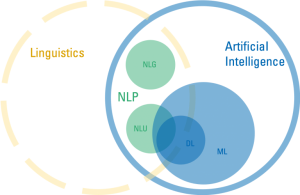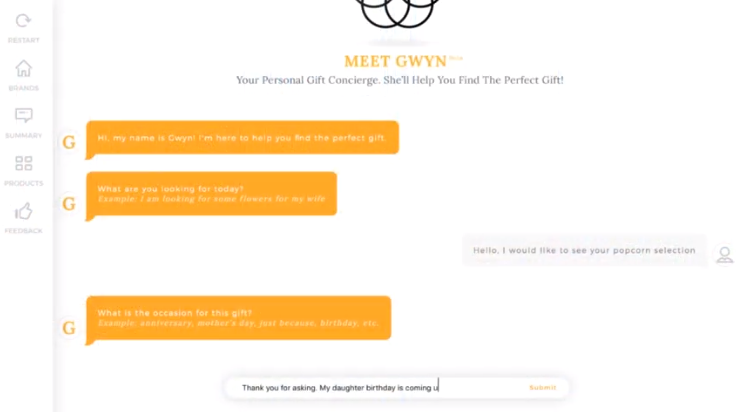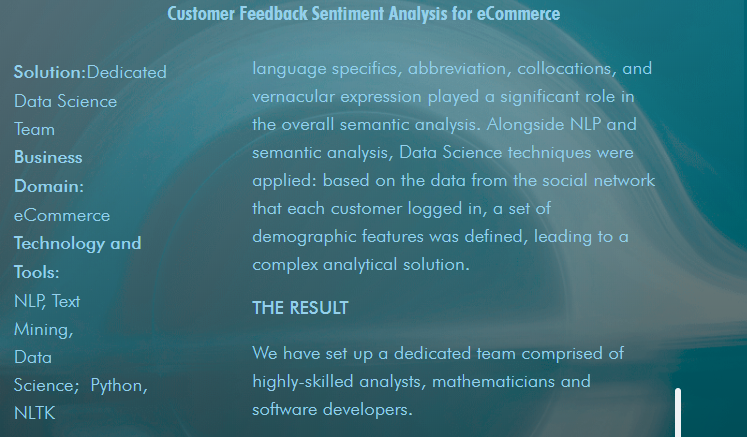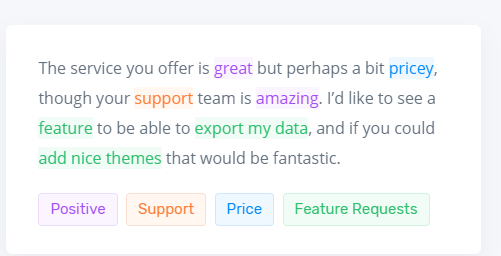It’s a well-known fact that the modern digital customer is willing to pay a premium for brands offering awesome and personalized customer experience. In fact, according to a Walker report, by the end of this year, CX will overtake price and product as the key brand differentiator. No wonder, businesses are increasingly competing on CX to win loyal customers and boost their bottom line.
However, in order to deliver positive and personalized experiences, marketers need to understand their customers better. Simply put, in order to personalize every interaction, they must measure customer behavior at every touchpoint and create razor-sharp customer profiles.
In recent years, natural language processing (NLP) integrated with machine learning (ML) has shown a lot of promise in helping marketers analyze customer data at a micro level. This branch of AI is allowing marketers to make targeted digital interactions with customers, offering them more bang for their buck.
So, what is NLP and how can it help digital marketers? That’s precisely what we will cover in this post. Read on to know how you can ride on the NLP bandwagon to improve your customer experience capabilities.
What is NLP?
NLP is a branch of AI that aims at enabling computers to make sense of human language (natural language).

NLP is at the intersection of AI and linguistics, in the sense that –
- It uses the rule-based approach to look for linguistic terms, such as ‘love,’ ‘hate,’ or ‘like’ and ‘dislike.’ The presence of such terms is used to derive a positive or negative interpretation of the sentence.
- It uses ML-powered statistical techniques to train algorithms to understand or predict sentiments.
Businesses have always relied on structured data (databases) for deriving insights. However, 80 percent of the data available to us is unstructured (in the form of documents, images, emails, and media). NLP aims at intelligently analyzing and converting this unstructured data into structured data, thereby enabling enterprises to stay agile and competitive. Thus, NLP can help you extract valuable insights from unstructured data and use it to deliver transformative business outcomes.
By integrating AI and NLP, businesses can uncover a whole new world of possibilities to improve their CX efforts. For instance, sentiment analysis, a branch of NLP, can be used to decode customer emotions through the tone of a comment. This can help marketers understand their target customers, identify trends, and improve various facets of the customer journey.
Why Are Humans (Marketers) Using Machines and Algorithms (NLP) to Understand Humans (Customers)?
As absurd as it may sound, machines and algorithms are more accurate in understanding human behavior than humans themselves. NLP and AI can analyze questions or comments shared by customers, break it down into individual components and understand the intent and sentiment involved. The AI algorithm then uses the insights derived from the interaction, existing customer data, and response templates to offer relevant suggestions. All this comes across as a seamless and personalized digital experience for customers even though it’s ‘less human’.


1-800-Flowers.com was probably one of the early adopters of AI and NLP. They offered customers an AI-powered virtual gift concierge service called GWYN (Gifts When You Need, informally known as Gwyn). Gywn is designed to mimic natural language, make recommendations, answer questions, and help customers find the most suitable gift for their loved ones. Thus, using AI and NLP the floral and gourmet food firm has been able to drive targeted interactions between their brand and the customer.
To sum it up, NLP helps businesses offer better customer experience through cognitive personalization. Thus, NLP technology is a powerful marketing tool that can help marketers analyze customer content, extract qualitative insights from it, and deliver great CX.
Now, let’s get down to the meat and potatoes! How can digital marketers use NLP to their advantage?
Leverage the Power of Sentiment Analysis
As of now, sentiment analysis is one of the most popular NLP applications used by marketers. Sentiment analysis is a branch of NLP that decodes the emotion and the tone of a text and connects it to an emotion, opinion, or attitude. It helps marketers map customer emotions using complex algorithms, thus allowing them to offer emotionally-intelligent support to customers.
Check out this case study by 8allocate, an AI development team. The team harnessed the power of NLP and text mining to help its ecommerce client optimize and upgrade their CX strategy.

MonkeyLearn is another natural language processing platform that helps businesses create value from unstructured data, thus saving their time and effort in the manual data processing. It uses its text-analysis model to tag the text automatically, thereby adding meaning to unstructured data.

Here are a few ways in which you can put sentiment analysis into action to improve your CX.
Monitor Social Brand Mentions
Using sentiment analysis you can keep a tab on how your audience is referring to your brand on social platforms. You can identify and classify prominent customer emotions through data collected from brand mentions, online feedback, and surveys.
Further, these social signals can also help in social segmentation and creating targeted marketing campaigns. For instance, NLP tools are able to extract the social handle of prospects who expressed interest in a particular brand.
Address Negative Sentiments on Priority
Sentiment analytics can be applied to product reviews to determine overall customer satisfaction. This helps the customer service team to prioritize the dissatisfied customers and effectively manage the situation. On the other hand, reviews with positive scores point out the factors triggering positive emotions in customers.
Track the Competition
Performing sentiment analysis helps marketers keep an eye on the competition. The insights derived can feed your marketing strategy. If a specific competitor is being mentioned by customers for a product feature or exceptional customer service, you could come up with a strategy to highlight your brand features or launch a product with a better feature.
Automate Customer Support Process
With sentiment analysis, you can automate the process of responding to customer feedback or queries. Once the customer comments are classified based on emotions, you can automatically direct it to the respective team or process.
Thus, if a customer mentions your brand for unsatisfactory service, they can be directed to the customer support team for resolving their issue and improving CX.
Customer experience is all about emotions! Use the power of sentiment analysis to understand your audience better and humanize interactions at every customer touchpoint.
Use NLP-Powered Smart Search to Improve Online Shopping Experience
NLP helps ecommerce marketers improve the online shopping experience through smart search. The technology adds contextually relevant keywords and synonyms to the product catalog in the metadata format, offering personalized in-store search experience to shoppers. Thus, NLP can prove to be a huge differentiating factor for ecommerce businesses.

On-site search and navigation platforms like Klevu are based on natural language processing and self-learning search. The platform makes it easy and quick for shoppers to find their desired products, thereby ensuring a seamless shopping experience for customers.
Use NLP to Power Your SEO and User Experience
Google’s biggest algorithm update in 2019, the BERT Natural Processing Language model allows the search engine giant to use its linguistic AI capabilities to understand the intent of searchers. This naturally made it imperative for search marketers to prioritize high-quality content, context, search intent, and NLP.
By using NLP and semantic annotations you can help search engines better understand your content, thus improving SEO and user engagement.
Structured Data Markup Automation
Natural language processing can be used to classify content and publish structured data markup that clearly describes your content to the search engine crawlers. WordLift is one such tool that applies AI-powered SEO to drive more eyeballs to a page.
This AI-based semantic tool adds a layer of metadata to the online content, allowing search engines to properly index and understand the pages. Further, semantically-connected content has a significant effect on customer engagement metrics.
Here’s an interesting presentation from PoolParty Semantic Suite that offers insights on creating content recommendations that combine semantic enrichments produced by NLP and neuronal networks.

Content Recommendation
A relevant and quality content recommendation is critical to keep searchers engaged with the content. A good content recommendation can significantly improve the dwell time – the time a person spends on a webpage after they have clicked a search result link and before they return to the SERP.
Using semantically-rich metadata can help improve the quality of the content recommendation, thereby allowing the user to stay on the page for a longer period.
Internal Link Building for Content Discovery
Linking your content internally helps search engines find your content and improve content discovery, thereby boosting user experience. By using NLP and training ML-based entity extraction algorithms you can create relevant in-links that provide quick information to the reader without them having to go elsewhere.
The Way Forward: Start Small and Scale Slow
The possibilities with NLP in digital marketing are endless. As a result, businesses may run the risk of trying too many NLP applications at one go or launching a CX project that lacks a tangible result.
Before investing in NLP, companies should critically consider several factors, such as their business goals, scalability, and the flexibility of integration. They should also set clear KPIs to measure the success of the AI-based CX project.
We are fast moving into an environment where unstructured data is heavily influencing most business decisions. By using NLP to their advantage, businesses will be better able to use this data to improve CX for their existing and future customers.

